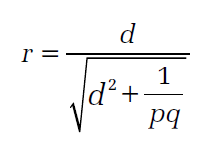New issue
Have a question about this project? Sign up for a free GitHub account to open an issue and contact its maintainers and the community.
By clicking “Sign up for GitHub”, you agree to our terms of service and privacy statement. We’ll occasionally send you account related emails.
Already on GitHub? Sign in to your account
cohens_d gives different results from cohen.d function from package psych. #222
Comments
library(dplyr)
mtcars$am <- factor(mtcars$am)
sum <- mtcars %>%
group_by(am) %>%
summarise(across(
.cols = mpg,
.fns = list(mean = mean, sd = sd, n = length),
.names = "{fn}"
))
#> `summarise()` ungrouping output (override with `.groups` argument)
sum
#> # A tibble: 2 x 4
#> am mean sd n
#> <fct> <dbl> <dbl> <int>
#> 1 0 17.1 3.83 19
#> 2 1 24.4 6.17 13Using the following to get the estimate of the population’s (pooled) sd: We get the same results from with(sum, {
d <- mean[1] - mean[2]
sp <- sqrt(((n[1] - 1) * sd[1] ^ 2 + (n[2] - 1) * sd[2] ^ 2) / (n[1] + n[2] - 2))
d / sp
})
#> [1] -1.477947
effectsize::cohens_d(mtcars$mpg, mtcars$am)$Cohens_d
#> [1] -1.477947However, in with(sum, {
d <- mean[1] - mean[2]
sp <- sqrt(((n[1] - 1) * sd[1] ^ 2 + (n[2] - 1) * sd[2] ^ 2) / (n[1] + n[2]))
d / sp
})
#> [1] -1.526417
psych::cohen.d(mtcars$mpg, mtcars$am)$cohen.d[2]
#> [1] 1.526417(and also subtracts the first mean from the second… But that would only change the sign.) I cannot find a source for using this formulation - so I'm not sure if this is a mistake, or deliberate on the part of |
|
Isn't this related to the Bessel's correction? (I think it mentions it here) |
|
Yes, I would expect to use Bessel's correction, to estimate the populations Cohen's d. Without it, it would say @studerus what book are you using? Interesting that it uses the sample SD instead of the estimated population SD. @DominiqueMakowski I guess I can note this in the docs of cohens_d / pooled_sd? What do you think? |
|
@mattansb |
|
My book also says that you can calculate Cohen's d from the Pearson correlation with this formula: where p and q are the proportions of the sample sizes of the two groups from the total sample. If I use the d that I calculated above and that you get with psych, I could confirm that I get r. With the estimate from effectsize package I get different results. |
|
FWIW: effectsize::cohens_d(CO2$uptake, CO2$Treatment)$Cohens_d
#> [1] 0.6652288
-1 * psych::cohen.d(CO2[, c('uptake', 'Treatment')], 'Treatment')$hedges.g
#> uptake
#> 0.6652288Created on 2020-12-04 by the reprex package (v0.3.0) |
|
This might explain it: Source: https://www.frontiersin.org/articles/10.3389/fpsyg.2013.00863/full |
|
Looking at McGrath, R. E., & Meyer, G. J. (2006). When effect sizes disagree: the case of r and d. Psychological methods, 11(4), 386., it seems that:
Which seems to be what However, as it is given in Harris Cooper, Larry V. Hedges, Jeffrey C. Valentine - The Handbook of Research Synthesis and Meta-Analysis-Russell Sage Foundation (2019) (and in any other places - see wikipedia, with all the references there):
Which is what we do here in Maybe we can add to The one "problem" I find here (which is unrelated to what @studerus brought here) is that the |
|
(If there's one thing you can't say about me, it's that I don't do my homework!) |
|
Okay here's what I've done:
@IndrajeetPatil Please see how this affects any of your code. |
|
Thanks for the heads-up! I think some tests for As for what the masses want, I am actually not sure. The first time we talked about this, we had compared results from |
I forgot about this!
Feel more like I'm off the deep end 🤪 Alright, closing... |





Here is an example:
gives 0.6652288
gives -0.6732924
When I calculate cohen's d manually, I can confirm the results of the psych package. So, it seems that the bug is in the effectsize package.
The text was updated successfully, but these errors were encountered: